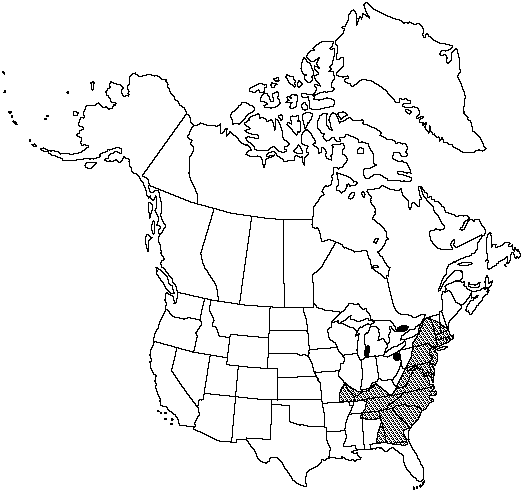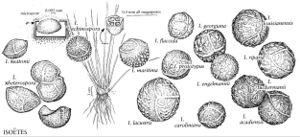Difference between revisions of "Isoëtes engelmannii"
Flora 29: 178. 1846.
FNA>Volume Importer |
(No difference)
|
Revision as of 18:09, 26 July 2019
Plants aquatic, emergent. Rootstock nearly globose, 2-lobed. Leaves evergreen, bright green, pale toward base, spirally arranged, to 60 (–90) cm, pliant, gradually tapering to tip. Velum covering less than 1/4 of sporangium. Sporangium wall usually unpigmented, occasionally ± brown-streaked. Megaspores white, 400–560 μm diam., reticulate, with unbroken lamellate ridges; girdle obscure. Microspores gray in mass, 20–30 μm, smooth to papillose. 2n = 22.
Habitat: Emergent or in shallow water of lakes, ponds, streams, and ditches
Distribution

Ont., Ala., Ark., Conn., Del., Fla., Ga., Ill., Ind., Ky., Md., Mass., Mich., Mo., N.H., N.J., N.Y., N.C., Ohio, Pa., R.I., S.C., Tenn., Vt., Va., W.Va.
Discussion
Isoëtes engelmannii is the most widely distributed quillwort of eastern North America. Plants with larger megaspores, ranging from 480–560 μm, have been called I. engelmannii var. georgiana Engelmann. This variety may represent a tetraploid cytotype. A tetraploid population of I. engelmannii (2n = 44) from northern Florida has larger megaspores characteristic of var. georgiana.
Isoëtes engelmannii hybridizes with I. echinospora [ = I. x eatonii Dodge (later synonym = I. x gravesii A. A. Eaton); I. flaccida; I. tuckermanii [ = I. x foveolata A. A. Eaton ex Dodge]; I. lacustris; and I. riparia [ = I. x brittonii Brunton & W. C. Taylor].
Selected References
None.
